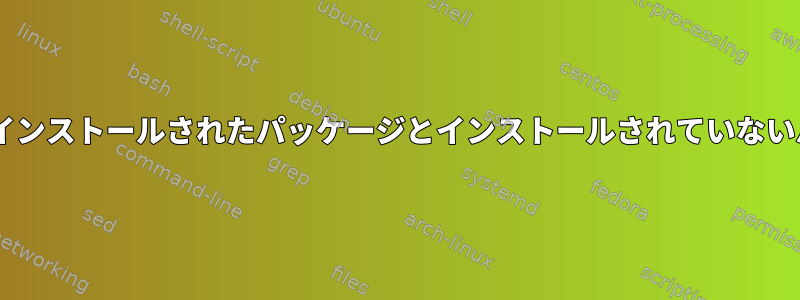
2018年末にインストールされたGentooを最新バージョン(2020年3月)にアップグレードしようとしています。私は与えられた指示に従っています。ここ。
最新(2020年3月)Gentooシステムがインストールされているホストがあり、そこから<old-inst>次のコマンドを使用して以前のインストールをインストールしようとしています。
emerge --ask --verbose --verbose-conflicts --update --deep --newuse --root=<old-inst> --config-root=<old-inst> @world --backtrack=20000
これにより、すでにインストールされているパッケージとアップデートでインストールするパッケージとの間にいくつかの競合が発生しました。以前のパッケージを削除し、上記のコマンドを使用して再度更新しようとすることで、これらの問題を解決しました。私の計画は、更新が正常に実行された後に削除されたパッケージを再インストールすることです。
この戦略は多くの紛争に効果がありましたが、今は解決できない紛争が発生しました。次の情報は次のとおりですemerge --update ...。
!!! Multiple package instances within a single package slot have been pulled
!!! into the dependency graph, resulting in a slot conflict:
dev-python/cffi:0
(dev-python/cffi-1.11.4:0/1.11.4::gentoo, installed) USE="-doc -test" PYTHON_TARGETS="python2_7 python3_6" pulled in by
>=dev-python/cffi-1.8:0/1.11.4=[python_targets_python2_7(-),-python_single_target_python2_7(-),python_targets_python3_6(-),-python_single_target_python3_6(-),-python_single_target_python3_7(-),-python_single_target_python3_8(-)] required by (dev-python/cryptography-2.8-r1:0/0::gentoo, installed) USE="-idna -libressl -test" PYTHON_TARGETS="python2_7 python3_6 (-pypy3) (-python3_7) (-python3_8)"
^^^^^^^^^^
>=dev-python/cffi-1.1:0/1.11.4=[python_targets_python2_7(-),-python_single_target_python2_7(-),python_targets_python3_6(-),-python_single_target_python3_6(-),-python_single_target_python3_7(-)] required by (dev-python/bcrypt-3.1.6:0/0::gentoo, installed) USE="-test" PYTHON_TARGETS="python2_7 python3_6 (-python3_7)"
^^^^^^^^^^
dev-python/cffi:0/1.11.4=[python_targets_python3_6(-),-python_single_target_python3_6(-),-python_single_target_python3_7(-)] required by (dev-python/pyzmq-16.0.2:0/0::gentoo, installed) USE="(-doc) -test" PYTHON_TARGETS="python3_6 (-python3_7)"
^^^^^^^^^^
(dev-python/cffi-1.13.2:0/1.13.2::gentoo, ebuild scheduled for merge) USE="-doc -test" PYTHON_TARGETS="python2_7 python3_6 (-python3_7) (-python3_8)" pulled in by >=dev-python/cffi-1.1:0/1.13.2=[python_targets_python2_7(-),-python_single_target_python2_7(-),python_targets_python3_6(-),-python_single_target_python3_6(-),-python_single_target_python3_7(-)] required by (dev-python/bcrypt-3.1.6:0/0::gentoo, installed in '/systemrescuecd/customcd/files/') USE="-test" PYTHON_TARGETS="python2_7 python3_6 (-python3_7)"
^^^^^^^^^^
dev-python/cffi:0/1.13.2=[python_targets_python2_7(-),python_targets_python3_6(-),-python_single_target_python2_7(-),-python_single_target_python3_6(-),-python_single_target_python3_7(-)] required by (dev-python/pyzmq-16.0.2:0/0::gentoo, installed in '/systemrescuecd/customcd/files/') USE="(-doc) -test" PYTHON_TARGETS="python2_7 python3_6 (-python3_7)"
この情報を正しく解釈すると、dev-python/cffi少なくとも2つのバージョンのパッケージがインストールされています。たとえば、バージョンは1.13.2パッケージごとにインポートされ、バージョンdev-python/bcryptはインストール1.11.4されます。だから私の計画はdev-python/cffi最初にパッケージを削除してemerge --update ...再試行することです。だから私はそうでした。
emerge --ask --root=<old-inst> --config-root=<old-inst> -C dev-python/cffi
しかし、Emergeはパッケージがインストールされていないことを報告して混乱しています。そうすると、emerge --update ...パッケージのバージョンがすでにインストールされていることを示すメッセージが再表示されます。それで、パッケージがインストールされましたか?そして、この紛争を解決する方法は?または、パッケージ情報が破損した場合に回復する方法はありますか?


